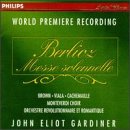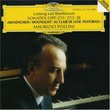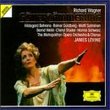| All Artists: Berlioz, Gardiner Title: Messe Solennelle Members Wishing: 0 Total Copies: 1 Label: Phillips Release Date: 3/15/1994 Album Type: Import Genre: Classical Style: Opera & Classical Vocal Number of Discs: 1 SwapaCD Credits: 1 UPC: 028944213720 |
Search - Berlioz, Gardiner :: Messe Solennelle
 | Berlioz, Gardiner Messe Solennelle Genre: Classical
![header=[] body=[This CD is available to be requested as disc only.]](/images/attributes/disc.png?v=15401716) ![header=[] body=[This CD is available to be requested with the disc and back insert.]](/images/attributes/disc_back.png?v=15401716) ![header=[] body=[This CD is available to be requested with the disc and front insert.]](/images/attributes/disc_front.png?v=15401716) ![header=[] body=[This CD is available to be requested with the disc, front and back inserts.]](/images/attributes/disc_front_back.png?v=15401716) |
Larger Image |
CD DetailsSimilar CDsSimilarly Requested CDs |
CD ReviewsA unique glimpse into the Berlioz of the future. Bob Zeidler | Charlton, MA United States | 12/11/2003 (5 out of 5 stars) "Two hundred years ago today, Louis-Hector Berlioz was born. This is a day for me to comment on a few of my favorite performances of his works, some of them "favorites by acclamation" and others simply those in which I find special merit, enough so that they are frequently in my CD players. Never mind that Hector Berlioz destroyed this student work. It is our good fortune that a copy of the manuscript survived these efforts, and moreover ended up in the hands of John Eliot Gardiner, who directs his Orchestre Révolutionnaire et Romantique and the Montiverdi Choir plus soloists in this premiere recording. (The story of the discovery of the manuscript, believed - or at least hoped - by Berlioz to have been destroyed, is very well set out in the comprehensive booklet notes, as are Gardiner's comments on the work and "getting it to work.") This is truly "Hector in the raw," the work of a 20-year-old Paris Conservatory student barely trained in the essentials (a burden he would carry around, on and off, throughout his life, thanks to his critics, not to mention his own proclivities toward writing music having few if any harmonic or rhythmic antecedents and which others couldn't fathom). The work clearly has its weaknesses: structural, harmonic, melodic, rhythmic and melodic immaturities simply flood the work, and it is little wonder that, after only two performances, Berlioz designated the work for the scrapheap. But either he kept good notebooks or he had total recall. So much of this work showed up later (suitably transmogrified, of course, but far from totally disguised) in several of his mature masterpieces: the Symphonie fantastique, the Requiem, the Te Deum, and even his mid-period opera Benvenuto Cellini. Anyone familiar with these works will have little trouble identifying precursor sources throughout the Messe Solennelle. And even the "bad bits" that never did get recycled into later works have their own share of visceral excitement and primitive charm, despite all the weaknesses noted. The performance, by Gardiner and his troupe, could hardly be more authentic short of partaking of time travel and actually being at the true premiere. The Orchestre Révolutionnaire et Romantique is a true period-instrument ensemble (and sounds it), not only for its insistence on the reproduction of "standard" instruments of the time (low-tension stringed instruments, valveless trumpets and horns, etc.) but also for its incorporation of instruments (which Berlioz in the main plucked out of the brass bands of the time) that have now been obsolete for nearly as long as the work has been around: bass brass instruments that include the ophicleide, the buccin and the serpent. And what a joyful noyse this ensemble makes! The vocal soloists are uniformly fine. Gilles Cachemaille, the bass, is an old hand at singing Berlioz, and Donna Brown (soprano) and Jean-Luc Viala, while not known to me before this recording also acquit themselves very well. Recorded now a decade ago, in Westminster Cathedral (to best simulate its initial premiere venue, Saint-Roch in Paris), the sound is certainly among the best for such a type of venue: a great sense of acoustical space, but not buried in excessive reverberation. Very nicely done! Not long after this recording came out, Bernard Holland, writing in the New York Times, said, "Mr. Gardiner seems to have the early franchise on the 'Messe Solennelle'." As far as I know, this is still the case a decade later. And perhaps that is as it should be; the last thing we need is to have another conductor come along, take a close look at the score, and try to "improve" it. Best that we hear this "Hector in the raw" as it was meant to be heard, and not all "prettified up." Bon anniversaire, M. Berlioz! Bob Zeidler" Musical scrapbook D. Seymour | 04/07/2000 (4 out of 5 stars) "It had long been thought that Berlioz destroyed all copies of his early Messe solennelle but the recent discovery of a surviving copy allowed this world premiere recording to be made. Recorded live, it draws a pretty tepid audience applause after the final clunky Domine, salvum. The work is admittedly pretty weak at times; Berlioz was probably justified in destroying the score as a whole but he was also right in salvaging the better parts, such as those that he later worked into his Roman Carnival Overture and Symphonie Fantastique, among other pieces. It's a fascinating listen, no matter what its shortcomings, for one can hear the genesis of many of his most popular themes. Gardiner and company do a great job in bringing it to life, in spite of the very reverberant acoustic." An Unexpected Masterpiece Samuel Stephens | TN, USA | 10/12/2007 (5 out of 5 stars) "Even when he abandoned (though he said he "destroyed") this work, Berlioz knew that it was pregnant with possibilities. We know that he admired this older material because he used so much of it in other works. From this work alone we get themes later heard in the Symphonie Fantastique, the Requiem, Te Deum, and Benvenuto Cellini.
One of the reasons this early choral of work of Hector's works so well, and is enjoyable today is the reason that makes all his works interesting: the guy was not interested in mere "filler" to fix his structure. He poured all his creativty (the imagination of a Nineteen year old!) into this work. The sections are all fairly short and to the point...there is almost no meandering musical themes for the sake of structure. Some of the opening sections however, can be a little grating. The openings to the "Credo" and "Crucifixus" are a little awkward. But taken as a whole, this is one amazing work. This is possibly the single best work from a major composer written in his/her young years, with the exception of Shostakovich's 1st symphony. Mozart doesn't count because he is a special case. Berlioz's early masterpiece is more colourful than most Masses by other composers, more interesting, and a whole lot more enjoyable. Fully recommended. P.S....don't worry about the fact that this music contains themes from several of his other works. You'll be so enchanted that you won't mind." |

 Track Listings (15) - Disc #1
Track Listings (15) - Disc #1









